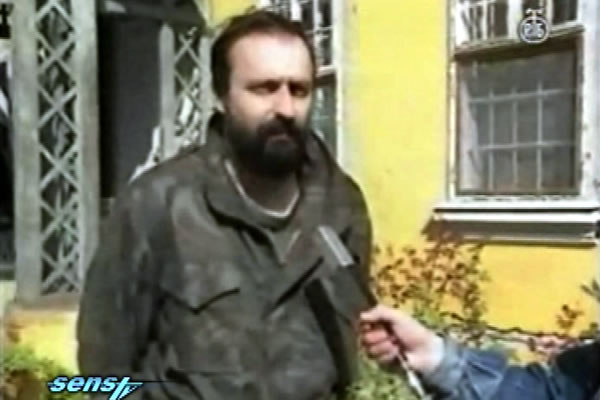Home
HADZIC WORE UNIFORM FOR REASONS OF HYGIENE
In Goran Hadzic’s opinion, his war-time statements didn’t ‘incite violence and reprisals’. He nevertheless still claims he would call for the Croats with ‘blood on their hands’ to be put on trial. He would in fact question their very right to be called humans at all. Did Hadzic wear uniform for reasons of hygiene or for military reasons?
 Goran Hadzic gives interwiev in Sid, 20th of November 1991
Goran Hadzic gives interwiev in Sid, 20th of November 1991 In the examination-in-chief and in his previous testimony at the trial of the former Vukovar mayor Slavko Dokmanovic, Goran Hadzic claimed that during the conflict he wore a uniform because there ‘was no electricity or water’. He ‘had to wear something to blend into the environment and the atmosphere’, Hadzic explained on those two occasions.
The prosecution alleges that Hadzic, who was the prime minister of the SAO Eastern Slavonia, wore a uniform to ‘send a message that it was his government’s policy to support the efforts to expand the territory of the Serb region’. According to the prosecution, Hadzic’s interview in Sid on 20 November 1991 after a government session corroborated this claim. The fate of about 200 men taken from the Vukovar Hospital and executed at Ovcara was sealed at the meeting, the prosecution alleges. In the interview, Hadzic says he will ‘take off the uniform’ if the ‘Serb people think that the borders of the Serb state as they stand now are sufficient’. Hadzic offered his opinion on the matter: according to him, ‘the Serb borders were much wider that they are now’, and therefore he had to keep on wearing a uniform. Now Hadzic explained that he didn’t link the fighting for land with a uniform. Hadzic blamed the journalist and his questions for that statement. According to Hadzic, he wore a uniform for practical reasons because he couldn’t ‘iron shirts and change suits’.
Prosecutor Douglas Stringer then presented another excerpt from same footage where Hadzic says that ‘the Government has met’ and that he ‘reached an agreement with the military authorities…’ that ‘the Ustashas who have blood on their hands shouldn’t be allowed to leave the area’. As for ‘the men who have been taken to Serbia, if they could be called human beings at all, they should be brought back in order to stand trial in the SAO Eastern Slavonia’, Hadzic says in the recording. Later Hadzic tried to distance himself from ‘the inflammatory statements’, whose goal, according to the prosecution, was to ‘incite violence and reprisals’. Those statements led to the killings at Ovcara, the prosecution alleges.
In the examination-in-chief, Hadzic argued that most of that interview wasn’t true. Today, he told the judges he would say the same thing today if he had ‘the same information about children being slaughtered and people wearing necklaces made of fingers’ that had been circulating at the time. Hadzic also claimed that he heard the ‘whole truth about the events on Ovcara only at the trial’. ‘When I gave that statement I didn’t have a clue and couldn’t in my wildest dream imagine what had happened at Ovcara’, Hadzic explained. Hadzic confirmed that he had heard ‘rumors’ about the Ovcara crimes when he visited Sremska Mitrovica in mid-December 1991. Since those stories were not ‘official’, Hadzic didn’t pay any attention to them.
Although the prosecutor had initially indicated he would most probably complete the cross-examination of Goran Hadzic today, he ended up disappointing the Trial Chamber in that regard. He had to ask leave to continue the marathon cross-examination of the first defense witness next week. The prosecutor will ask Hadzic questions about his responsibilities and powers during his term of office as the president of the Republic of Serb Krajina.
Linked Reports
- Case : Hadzic
- 2014-08-27 PRIORITIES SET BY HADZIC’S GOVERNMENT
- 2014-08-26 HADZIC: POLITICAL UNTRUTHS ARE NOT LIES
- 2014-08-25 SERB MAJORITY ACHIEVED BY MAKING NON-SERBS LEAVE AND SETTLING SERBS
- 2014-09-01 DID HADZIC THREATEN OR PROTECT INVESTIGATOR?
- 2014-09-02 WHAT HADZIC ACTUALLY MEANT TO SAY
- 2014-09-03 CONFLICT IN CROATIA THROUGH EYES OF BRITON
